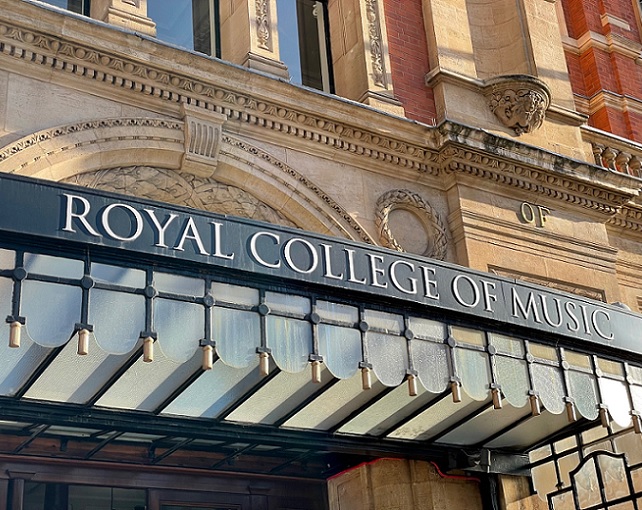

Portraits of the late Benjamin Britten and Michael Tippett gaze down on performers in the Amaryllis Fleming Concert Hall.
Britten famously said that he never wrote a piece for trumpet player Philip Jones because, ‘…he couldn’t hear the sounds of brass in his head’. Had he been here for this concert he might, like Tippett, have been more inspired to write for the medium.
Gregson feature
Most of this concert featured the music of Edward Gregson, conducted by the composer.
Two short works, ‘Fanfare for a New Era’ and ‘Flourish for the RCM’ opened the first and second halves respectively, both played with panache, whilst ‘Symphony in Two Movements’ provided ample opportunities for contrast with sweet playing from the trumpets balanced against the darker hues of the flugel and low brass.
Notable was the use of an E flat soprano in place of the E flat trumpet, demonstrating that when the instrument is played without vibrato it can blend as well as project in considered hands.
The young players took the demands of the music in their stride, although the detail of the more densely scored passages was lost to the hall’s acoustic.
Notable was the use of an E flat soprano in place of the E flat trumpet, demonstrating that when the instrument is played without vibrato it can blend as well as project in considered hands.
His early ‘Quintet for Brass’ was securely delivered, the tempi steady rather than exciting, with only one minor hiccup towards the end. It was good to hear the work played with an appreciation of stylistic nuance.
Music of the Angels
The imposing ‘Music of the Angels’, adapted from his original brass band composition ‘The Trumpets of the Angels’, commissioned by Foden’s Band in 2000, provided a fine climax to the concert.
It’s starting point comes from a quotation from the Book of Revelation: “…and I saw the seven angels which stood before God; and to them were given seven trumpets.”
Each delivers with imposing Biblical authority – the last an apocalyptic four note motif climax spanning three octaves to herald the end of time. The demands were well met, with lyrical contributions from flugel horn and euphonium leading to Andrew Crowley delivering the seventh trumpet call from the balcony behind the audience with omnipotent certainty.
Chilean delight
Two other items completed the programme. Roxanna Panufnik’s ‘Prayer’ was first heard at the Philip Jones memorial concert in 2001. Here it was conducted by one of the students, Stone Tung, and provided a welcome moment of repose, shifting from conventional harmony to dissonance and back again.
Portrayed in both bold colours and timbres as well as delicate pastel shades it embraced ensemble assuredness as well as theatrical surprise, utlising space, time and performer elements to wonderful effect.
The first performance of RCM student Tomás Brantmayer’s ‘Chinita del desierto’ was also conducted by Tung.
Scored for large brass ensemble and percussion, it also utilised the sumptuous sound of the Flentrop Orgelbouw organ which dominates the hall in its description of a religious folk festival which takes place in northern Chile (from where the composer presumably comes).
Portrayed in both bold colours and timbres as well as delicate pastel shades it embraced ensemble assuredness as well as theatrical surprise, utlising space, time and performer elements to wonderful effect.
Hopefully this will be one composer who can be persuaded to write, much, much more for the brass medium.









